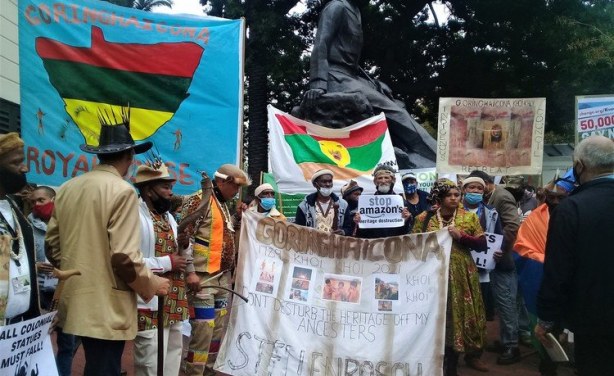-
South Africa: Indigenous Land Dispute Dogs Amazon's Africa Expansion
Thomson Reuters Foundation, 9 August 2021
The near $300 million development, housing Amazon's new African HQ, is set to be built on historical South African indigenous land Read more »
-
South Africa: 'Walk of Resistance' Against Amazon Site
GroundUp, 17 June 2021
A petition signed by 50,000 people opposing the R4.5bn mega-development has been handed over to Mayor Dan Plato Read more »
-
South Africa: Bo-Kaap's 'Walk of Resistance' Against Amazon's River Club Development
Daily Maverick, 17 June 2021
While some may be excited to see the development of Amazon's headquarters in Cape Town, on 16 June a group protested against the development, gentrification and colonial statues. Read more »
Urban Development of Sacred South African Land Angers Protesters
Over 500 years ago, South Africa's indigenous Khoi and San population fought off a Portuguese attack in one of the first, and most successful, anti-colonial battles in Africa. Today, some descendants of the Khoi and San view U.S. retail giant Amazon's attempts to build an Africa headquarters on the same land in Cape Town in similar terms, writes Kim Harrisberg for the Thomson Reuters Foundation.
The near U.S.$300 million development, housing Amazon's new African headquarters has seen over 56,000 people signing a petition to opposing its development. Liesbeek Leisure Properties Trust (LLTP), who said the project would create jobs, attract foreign investment and improve Cape Town's quality of life, is the company overseeing construction.
The area, at the confluence of two rivers, is the ancestral home to the earliest Khoi and San inhabitants in Southern Africa. It carries cosmological, spiritual and environmental significance to these indigenous groups. Following the victory against the Portuguese, the Khoi later battled against the Dutch in 1659. After the Dutch prevailed, it is where colonial administrator Jan Van Riebeek launched a campaign of land dispossession, an event that researchers and activist say laid the bedrock for what would become apartheid white minority rule years later.
LLTP have proposed honouring the Khoi and San history by constructing a heritage garden, a media centre, an ampitheatre and naming internal roads after indigenous leaders.

About 100 people marched through Cape Town city centre to deliver a petition with 50,000 signatures objecting to the proposed Amazon development at the Two Rivers Urban Park (file photo).

